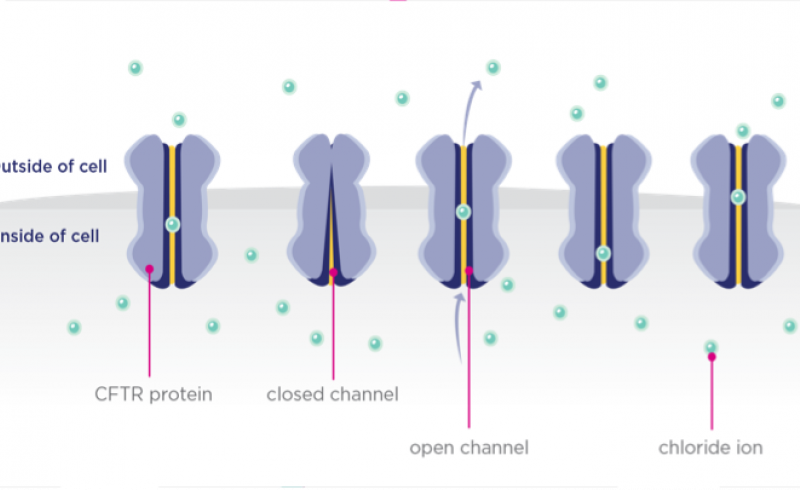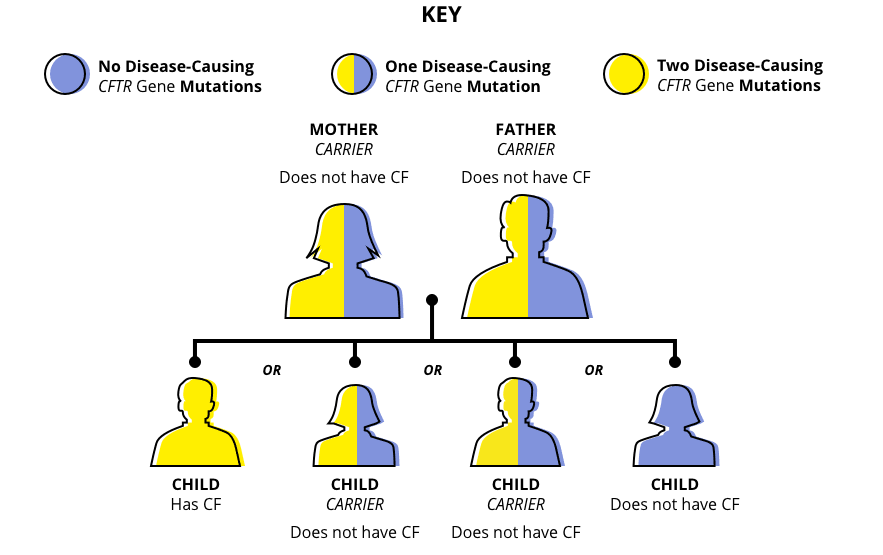CF Within the Cells
The role of genes
Genes carry the instructions for every part of the body. An error or mistake in these instructions can cause certain diseases.
A specific gene is responsible for CF. It’s called the cystic fibrosis transmembrane conductance regulator (CFTR) gene. This gene contains the instructions for producing CFTR proteins, which do an important job on the surface of certain cells throughout the body.
But when someone has CF, a change (called a mutation) in each of the 2 copies of this gene results in CFTR proteins that aren’t able to do their job. Because of this, mucus, which is a slippery substance lining many different organs, gets too thick, causing infections and damage.

If someone has a mutation in 1 of their CFTR genes, it means they’ll have CF.


Here’s the fact: In order for someone to have CF, they must have a mutation in both of their CFTR genes. Learn More >
CFTR Protein Defects
Defects vary by mutation
Over 2000 mutations in the CFTR gene have been discovered. About 1700 mutations cause the protein defects that result in CF.
Watch the videos below to learn about these CFTR defects


CFTR gene mutations and defective CFTR proteins
CFTR gene mutations and defective CFTR proteins
Mutations that affect the function of CFTR proteins
Mutations that affect the function of CFTR proteins
Mutations that affect the quantity of CFTR proteins
Mutations that affect the quantity of CFTR proteins
CF and Your Genotype
How knowing the genotype can help
Different mutations affect CFTR proteins in various ways. As a result, CF symptoms and when they occur can be different for everyone.
Knowing the genotype can help someone with CF:
- Better understand CF symptoms and how CF can progress
- Build a personalized CF care plan with the healthcare provider
STAY CF SMART: It’s important for someone with CF to have a conversation with their healthcare provider to learn about CF treatment options available to them.
Unsure about your or your child’s genotype? Here are important things to ask the healthcare provider at your next visit:
- What steps should I take to find out my or my child’s genotype?
- How does the genotype play a role in developing a CF care plan?
- How do CFTR mutations affect the way the body works?

If both parents are carriers of a CF-causing mutation, there is a 100% chance that their child will have CF.


Here’s the fact: When both parents are carriers of a disease-causing CFTR gene mutation, each of their children has a 25% chance of inheriting CF. Learn More >
Impact on the Lungs
Starting from a young age, lung damage may occur before it can even be noticed
There's one thing that remains the same across CF-causing CFTR protein defects—they all cause mucus in different parts of the body to thicken. Even if someone with CF doesn’t feel it, this mucus can cause damage from an early age.
Thick, sticky mucus is found in the airways of the lungs and may cause symptoms such as wheezing, shortness of breath, and a persistent, phlegmy cough. This mucus buildup can’t be cleared from the airways easily.
There are bacteria found in this mucus buildup as well, causing infection, inflammation, and scarring.
For someone with CF, a common bacteria in the respiratory tract is called Pseudomonas aeruginosa.
STAY CF SMART: When first found, Pseudomonas aeruginosa should be treated immediately with antibiotics and may require continual treatment over time.
Pulmonary exacerbations lead to lung damage
Pulmonary exacerbations lead to lung damage
Pulmonary exacerbations lead to lung damage
The buildup of mucus and germs can also lead to pulmonary exacerbations. Most people with CF are familiar with pulmonary exacerbations as periods of time when symptoms and/or lung function worsen. Pulmonary exacerbations may require treatment with antibiotics (by mouth, inhaled, or intravenous [IV]) and/or a hospital stay.
STAY CF SMART: Pulmonary exacerbations may cause permanent lung damage that advances disease progression. It’s important to have regular check-ins with your care teams so they can monitor respiratory symptoms and lung function.
The inflammation caused by clogged mucus and bacteria can damage the airways. This can lead to a condition called bronchiectasis. People with bronchiectasis have airways that are scarred and widened, making it harder to clear mucus. It also makes it difficult for air to move in and out of the airways.
People with CF can have other lung conditions—like asthma
People with CF can have other lung conditions—like asthma
People with CF can have other lung conditions—like asthma
About 20% to 30% of people with CF can also have asthma. Diagnosing asthma in someone with CF can be challenging, and care teams may adjust breathing treatments, if needed, to treat both conditions.
How cystic fibrosis (CF) affects the lungs
How cystic fibrosis (CF) affects the lungs
Learn about progression in the lungs
Learn about progression in the lungs
Pulmonary exacerbations may require treatment with antibiotics (by mouth, inhaled, or intravenous [IV]).



Pulmonary exacerbations occur when symptoms and/or lung function worsen. Pulmonary exacerbations may require treatment with antibiotics (by mouth, inhaled, or intravenous [IV]) and/or a hospital stay. Learn More >
Digestive System Impact
Thicker digestive fluids damage organs
Thicker digestive fluids damage organs
Thicker digestive fluids damage organs
While CF is often thought of as a problem with the lungs, it also causes significant problems in the digestive system, including the pancreas, the liver, and the intestines.
The pancreas 
Thick fluids block the ducts (small tubes) within the pancreas, an organ that makes enzymes that break down food. This blockage makes it harder for the enzymes to reach the small intestine where they do their job.
Without these enzymes, the body has trouble breaking down food and absorbing nutrients. Not having these enzymes leads to:
- Poor growth and slow weight gain, even if a lot of food is eaten
- Frequent, greasy, and bulky stools
The liver 
The liver is another part of the digestive system affected by this mucus. Inside the liver are ducts that are meant to drain it of bile. In people with CF, bile is thicker. As a result, the bile ducts can become blocked, leading to irritation or inflammation in the liver.
The intestines 
Thicker digestive fluids can also block the intestines. In most people with CF, blockage of the intestines mainly leads to chronic constipation. It can also lead to acute conditions such as meconium ileus and distal intestinal obstruction, also known as DIOS. Meconium ileus is a serious form of intestinal blockage that occurs only in newborns, whereas DIOS is an acute problem that can occur at all ages. Both meconium ileus and DIOS may require immediate medical intervention to be treated.
How cystic fibrosis (CF) affects the digestive system
How cystic fibrosis (CF) affects the digestive system
Learn about progression in the digestive system
Learn about progression in the digestive system
Other Effects of CF
Mucus buildup also causes problems in other organs
Mucus buildup also causes problems in other organs
Mucus buildup also causes problems in other organs
Sinuses
Impact on the sinuses
The sinuses produce mucus, which helps keep them clear by protecting them against dust, dirt, and bacteria. With CF, the sinuses may fill up with thick mucus that is difficult to clear out.
If left untreated, the mucus blocks the sinuses, causing pressure and pain, which triggers inflammation that may contribute to nasal polyps. It also allows bacteria to grow, leading to sinus infections or sinusitis.
Nasal polyps
Nasal blockage in someone with CF is commonly caused by nasal polyps. A nasal polyp is a growth in the nose that is filled with fluid or mucus and blocks where the sinuses drain into the nose. This contributes to mucus buildup in the sinuses and sinusitis.
Fertility
-
Impact in women
For a woman who has CF, thick mucus in her reproductive system may make it difficult for sperm to travel to the uterus. This may make fertilization of a woman’s eggs difficult.
-
Impact in men
As a result of CF, men may experience fertility issues as well because the tubes through which sperm need to pass may not have formed, or they may be clogged with thick, sticky mucus. So although intercourse may be normal, a man with CF may deliver little or no sperm.
CF is only a disease of the lungs.


Here's the fact: CF affects many different systems of the body. Learn More >
How cystic fibrosis (CF) affects the bones, liver, and sinuses
How cystic fibrosis (CF) affects the bones, liver, and sinuses

CF only affects the male reproductive system.


Here’s the fact: CF often affects the fertility of both women and men. Learn More >





